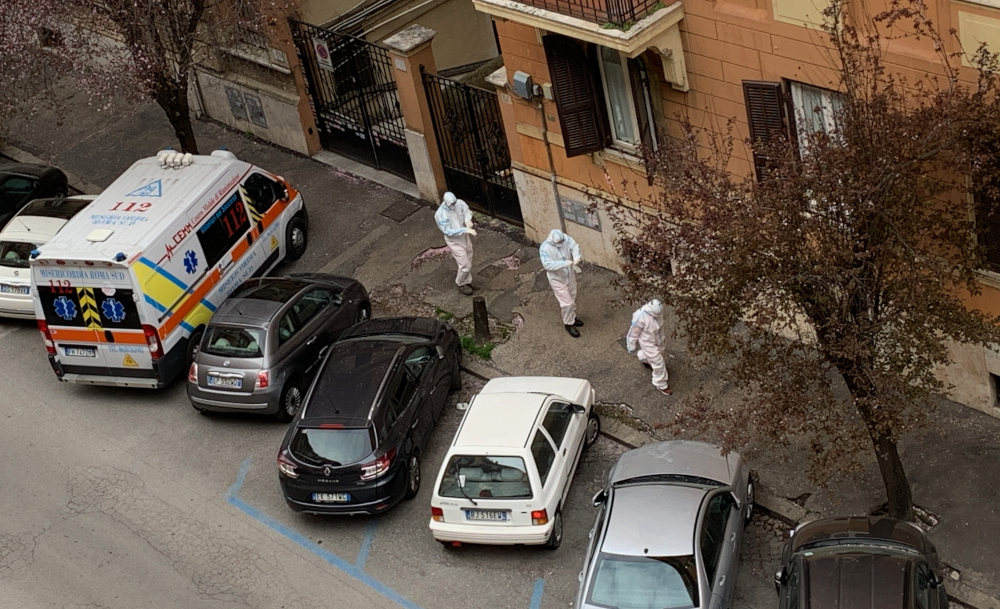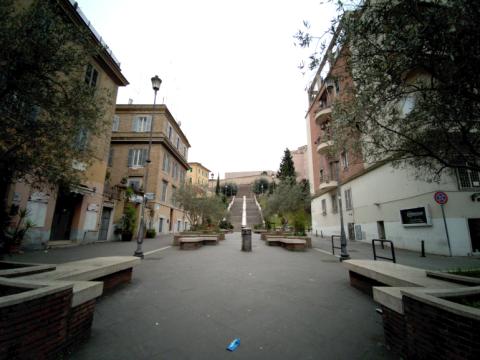
Healthcare professionals exit an ambulance on a central Roman street outside the author's apartment March 17. (NCR photo/ Joshua J. McElwee)
An ambulance appeared on our street this morning. Three healthcare workers got out, all wearing white, head-to-toe hazardous material outfits. They entered the building across from ours, shouting for the few people on the street to keep distance from them as they walked to the door.
A few minutes later, the three reappeared on the street. This time a middle-aged woman accompanied them, wearing a mask and a coat over pajamas. The ambulance backed up, the siren turned on, and off they went to a hospital somewhere.
It's part of our new pattern of life here in Italy, at the heart of what the World Health Organization calls the European epicenter of the coronavirus outbreak.
I've seen an ambulance come for someone only twice in the past few days. But I can see only about half of one street on our block in central Rome from our windows. So, I don't really know that much.
Like everyone else across Italy, we're in strict lockdown — unable to leave except to buy groceries, go to the pharmacy or see a doctor.

An empty square is seen near a set of stairs that leads to the Vatican Museums in Rome March 13, 2020. (CNS photo/Junno Arocho Esteves)
I've left the building once since Prime Minister Giuseppe Conte's March 9 announcement of the new containment measures. I all of crossed the street to take out our trash. My wife has been a bit more adventurous: walking a few blocks once on a grocery run.
The stores are stocked — in our experience, Italians don't hoard things all at once like other nationalities we know — but shopping now takes patience and extra care. Everyone must maintain at least a meter of distance between each other at all times (about three feet), so stores are under strict limits about how many people they can admit at once.
The result is lines to enter that curl around blocks, each person standing far back from the person in front of them.
Not knowing much. A new pattern of life. Lockdown.
Stranded at home, I find my focus narrowing. I think of my immediate surroundings, my neighbors, the people I know. Are they OK? My eye catches a photo of my late grandfather. It reminds me that my grandmother is at risk, quarantined in a nursing home (aka a petri dish) half a world away.
My parents call. I urge them to take this seriously, to practice social distance, to stop seeing people, all people. Just because the U.S. government hasn't been doing much doesn't mean it's only an Italian or a European thing.
Advertisement
We build our day here around small things. I watch Pope Francis' Mass in the morning, listen to his homily. We go for a walk on the roof of our building at about noon, milking each of the some 200 steps back and forth. (My wife has become a pro at this. She somehow did a roof circuit of 4.34 miles in one day.)
The big moment of socialization for the day comes at 6 p.m., when people across Italy have been appearing at their windows to sing, play music or just wave at each other. When you're locked up day in and day out, the experience of even seeing someone else at a window is unexpectedly joyous.
We're lucky: Two of our closest friends live in the building behind us, so if we go to our respective roofs and shout quite loudly we can even hear each other's voices "in person."
But the comedown from that bit of social contact is stark, because 6 p.m. is also the time each day when the Italian government announces the new figures of infection, and how many have died in each of the country's 20 regions.
Despite the lockdown, the numbers continue to be dramatic: On March 16, 27,980 people had tested positive. 2,749 of those were considered healed, but at least 2,158 had died. The center of Italy's crisis to be the region around Milan (Lombardy), where there have been at least 14,649 cases and 1,420 deaths.
Living with such numbers, one becomes grateful for the Italian government's response, lockdown and all. The whole thing is centralized. Each region has a hotline number to call in case you fear you are experiencing symptoms of the virus, and, if warranted, they'll send an ambulance to your home to administer the test.
That's what I assume happened for our neighbor across the way. Or I hope. The fact that the ambulance took her away makes me worry it is worse for her.
My eye catches the photo of my grandfather again. I remember one of Gramps' favorite phrases, always said with a certain lilt in his gravelly, cancer-scarred voice: "Can't complain. Wouldn't do much good anyway."
[Joshua J. McElwee (jmcelwee@ncronline.org) is NCR Vatican correspondent. Follow him on Twitter: @joshjmac.]







